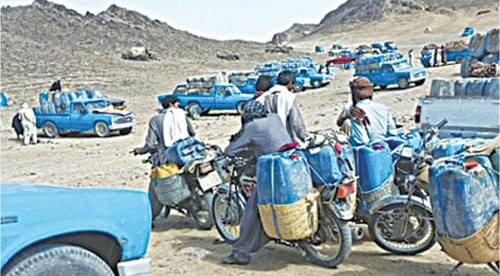ISLAMABAD: Amid supply chain challenges leading to the closure of refining units and storage constraints, the government has asked the Ministry of Interior and the Federal Board of Revenue (FBR) to start immediate operations against oil smuggling with the support of other stakeholders.
Informed sources told Dawn the prime minister had also taken up the matter with the defence authorities to extend maximum support to the civil agencies concerned in eradicating smuggling, which causes annual losses of hundreds of billions of rupees and negatively affects the smooth functioning of the petroleum supply chain, including refineries and marketing companies.
Separately, the Ministry of Interior and the FBR have been directed to take “appropriate and immediate action to address this critical issue”, according to a communication of the petroleum division based on a complaint by the Oil Companies Advisory Council (OCAC) to the Special Investment Facilitation Council (SIFC) and the Prime Minister’s Office.
Interestingly, all the five domestic refineries jointly, individually and as part of the OCAC — an umbrella organisation of about three dozen refineries and petroleum marketing companies — have been writing almost daily to the petroleum division and the Oil and Gas Regulatory Authority (Ogra) about the challenges to their survival and threat to about $6 billion worth of upgradation plans because of the massive influx of smuggled oil products in the market.
Referring to letters to the SIFC, the petroleum division said the OCAC had highlighted the issue of petroleum smuggling, which posed a grave threat to the forthcoming investments in refinery expansion and upgradation projects under the Oil Refining Policy for Upgradation of Brownfield Refineries, 2023.
“This illicit activity not only bleeds the economy but also jeopardises the opportunity for substantial investments in refinery upgradation,” the petroleum division wrote to the interior ministry and the FBR on Thursday. “The ramifications extend beyond the refinery sector, impacting the profitability of oil marketing companies (OMCs), dealers, and disrupting the white oil pipeline operations.”
The petroleum division said the refineries were currently carrying huge stocks of high-speed diesel (HSD) due to the availability of smuggled fuel in the market. This reduced refinery throughput and production of other petroleum products.
“This situation is disturbing the entire oil supply chain and needs immediate correction,” the Ministry of Interior and FBR were told.
On the same day, the OCAC again reminded Ogra and the petroleum division that HSD stocks had reached a “critically high” level, enough for 44 days of consumption cover.
This posed “significant challenges to the sustainability of the oil industry. The alarming disparity between the high stocks of HSD (650,000 tonnes in storage) and the persistently low sales (14,700 tonnes against the planned 23,000 tonnes) is primarily attributable to the rampant smuggling of POL (petroleum, oil and lubricant) products from Western borders, has started to exert adverse effects on the refineries and OMCs”, the advisory council said.
The OCAC reminded Ogra that extensive deliberations on strategies to address the issue in many monthly product review meetings had been unsuccessful due to the pervasive influence of smuggled products.
“Demand destruction and surplus inventory have created a vicious circle, wherein the industry is struggling to maintain operational viability.”
The oil industry urged Ogra and the petroleum division to “recognise the cascading implications of this challenging situation, exacerbating financial strain throughout the supply chain”.
While the OMCs legitimately sold HSD during the peak agriculture season, suppressed market demand impacted their cash flows, rendering the oil marketing companies unable to fulfil their financial obligations to refineries and simultaneously retire letters of credit (LCs) for imported products.
Consequently, refineries’ ability to make timely payments for crude oil imports will be compromised. Because of these issues, the oil industry will again face similar challenges as encountered in 2022, when establishing LCs became an uphill task due to the country’s rating in the international market.
Due to high HSD stock levels, refineries were also constrained from curtailing their throughput, which also impacted the production of petrol and jet fuel.
The OCAC called upon the government institutions to “take immediate and decisive actions to restore market equilibrium and save the refineries, white oil pipeline and OMCs from collapse. The refineries also warned of “a serious threat to the opportunity of huge investment in the country due to the staggering influx of smuggled petroleum products from Iran”.
“It would, therefore, be most unfortunate if the planned upgradation projects are delayed or abandoned due to continued illicit activity which is already bleeding the economy and has disrupted the entire supply chain of petroleum products, adversely affecting the refinery health, white oil pipeline operations, and the profitability of oil marketing companies and dealers,” the council warned.
Published in Dawn, April 26th, 2024














































Dear visitor, the comments section is undergoing an overhaul and will return soon.